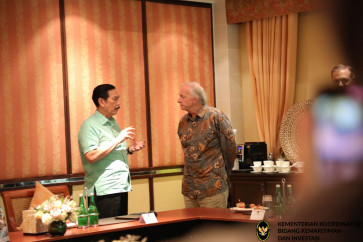GE seeks to expand USC technology in Indonesia
United States-based technology company General Electric (GE) has expressed an interest in implementing the wider use of a technology it claims will be able to make coal-fired power plants more efficient, considering that the latter remains a dominant power source in Indonesia
Change text size
Gift Premium Articles
to Anyone

U
nited States-based technology company General Electric (GE) has expressed an interest in implementing the wider use of a technology it claims will be able to make coal-fired power plants more efficient, considering that the latter remains a dominant power source in Indonesia.
President director of GE Operations Indonesia David Hutagalung said the company would implement the ultra-supercritical (USC) technology at the Java-3 coal-fired power plant, which has a total capacity of 2 by 660 megawatts (MW) in West Java.
He added that USC technology allowed coal-fired power plants to operate above the critical point of water temperature and pressure, meaning better efficiency for coal burned to generate electricity.
“Having efficiency means fewer coal to burn in order to generate electricity [...] With USC technology, the [coal] burning process are cleaner and adhere to higher standards of emissions [control].”
David said GE would provide a steam turbine, a generator as well as an air quality control system (AQCS) to the Java-3 plant, adding that currently the project was nearing the financial closing phase.
The Energy and Mineral Resources Ministry’s director general of electricity, Andy Noorsaman Sommeng, confirmed that the Java-3 power plant would use USC technology, adding that the government would make an effort to proliferate the use of the technology to other coal-fired power plants.
“Because the [USC] technology is more efficient and environmentally friendly,” Andy said, adding that most of the proposed plants that would be using it were still in the construction phase.
According to the electricity procurement business plan (RUPTL) for 2018 to 2027 for state owned electricity firm PLN, several coal-fired power plants are planning to use USC technology, including the Java-4 and Java-7 plants, among others.
The 2 by 1,000 MW Java-4 plant, which is located in Jepara, Central Java, is set to become operational in 2021. The Java-7 plant also has a similar total capacity as Java-4 and is located in Serang, Banten. The plant is expected to start operating next year.
The RUPTL 2018-2027 also projected that the role of coal in the total energy mix would remain dominant at 54.4 percent in 2027, while gas and renewable energy contributed 22.2 and 23 percent, respectively, to the total energy generation over the same period. The commercial general manager of GE Power, Sacha Parneix, said it would make sense to use USC technology in Indonesia due to its efficiency in power generation.
“Since coal is going to be a fundamental part of the Indonesian energy mix and hence a key factor in the growth and development of the Indonesian economy, it makes absolute sense to use the highest efficiency, lowest emissions technology,” Parneix added. “Today, that [technology] is ultra-supercritical [USC] technology because it offers electricity generation […] with the lowest possible local and global emissions.”
Aside from Java-3, David said GE would provide USC technology to other coal-fired power plants in Indonesia, particularly projects outlined in the RUPTL that still lacked a technology provider.
He added that currently GE had wider engineering, procurement and construction (EPC) capabilities after acquiring French industrial giant Alstom’s power and grid businesses in 2015.
Any coal-fired power plants that will be equipped with USC technology in Indonesia will follow in the footsteps of Manjung 4, the first coal-fired power plant in Southeast Asia to adopt it.
Manjung 4 has been operated by Malaysian state-owned TNB Janamanjung Sdn. Bhd. — a subsidiary of Malaysian state-owned Tenaga Nasional Berhad (TNB) — since 2015. It has a capacity of 1,000 MW and is located on a reclaimed island in Seri Manjung, Perak state, Malaysia.









